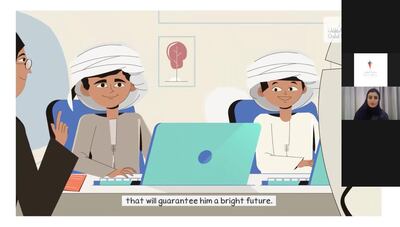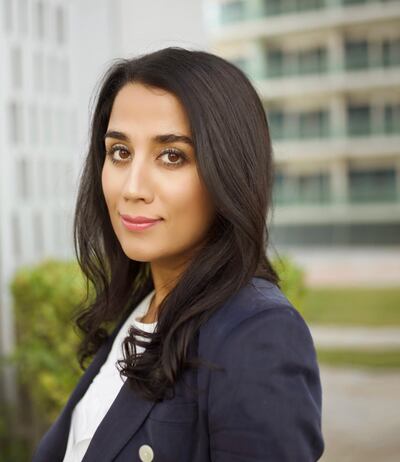The surge in remote learning during the pandemic has put children at risk from predators online, a senior UN official said.
Eltayeb Adam, the Gulf representative for Unicef, said many youngsters were unaware of the dangers and some were at risk of abuse.
Mr Adam urged governments to prioritise opening schools, if safe to do so, while also ensuring children were protected when using the internet.
More than 90 per cent of pupils around the world spent some of the school year outside the classroom.
"1.6 billion children around the world were affected by Covid-19 and their learning was disrupted," Mr Adam told The National.
"They also had issues around well-being and mental health ... not being able to associate with other children and being isolated.
"That is why we continue to advocate for keeping schools open as much as possible.
“Of course, you have to implement safety measures and make sure that children are safe, but school is the best place for children because they will be able to learn more effectively and at the same time to socialise as children.”
Unicef said more than 30 per cent of children still do not have access to distance learning through the internet, TV or radio, and 24 million children are could drop out of school because of the pandemic.
But those who do have access to remote learning face another danger.
“Children could also be subjected to violence, abuse, or even to sexual abuse,” Mr Adam said. “We are working with the UAE authorities to see how we can address this issue.”

One organisation in Sharjah is addressing the threat. The Child Safety Department organised 12 online workshops in collaboration with Sharjah Police and the Sharjah Prevention and Safety Authority, to raise awareness of children’s rights, safety and cyber security.
It was attended by more than 950 people, including 830 children.
“Ensuring the safety of children begins with becoming aware of what they may face in both the online and the real world,” said the CSD’s director, Hanadi Al Yafei.
“A few decades ago, falling from balconies was not considered as a prime safety issue as there were no tall buildings here. The same applies to cybersecurity and safety,” she said.
“We therefore urge parents and teachers to proactively learn and familiarise themselves with new technologies and how they work, to ensure the online safety of their children.”
In March last year, Sheikh Saif bin Zayed, Deputy Prime Minister and Minister of Interior, launched the “child digital safety” initiative to protect children from online threats.
The scheme included an interactive children’s camp to teach five to 18-year-olds how to use the internet and social media safely, a “digital well-being portal” to provide information for parents, and a support platform where people with questions on digital safety can speak to experts.

Maryam Ehsani, founder of Child Safe Middle East, previously worked as a child protection adviser at Dubai Police. Her advice to parents is to educate youngsters about stranger danger.
“You need to have the uncomfortable conversations with your children,” she said.
“You need to tell them about the alarming behaviour that can take place online and what they need to look out for and share with you.
“As parent and caregiver, we all have a responsibility to make sure the device they are using is protected.”
Anyone who suspects child abuse can contact the Ministry of Interior’s Child Protection Centre on 116 111, while Dubai has a 24-hour hotline, 800 988.


